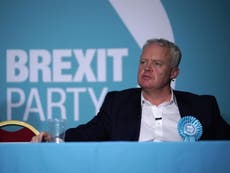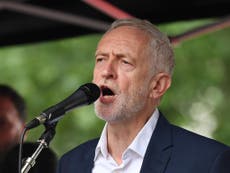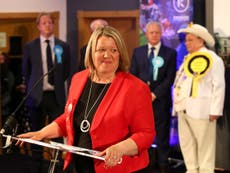Labour’s victory over the Brexit Party is a reminder of the enduring power of the political party machine
Farage's insurgent party were no match for Labour’s well-manned and slick operation
The result of the Peterborough by-election has come as a surprise to some, and a relief to others. The by-election was called after the local Peterborough residents utilised new rules to recall their sitting MP, Labour’s Fiona Onasanya, after her conviction for perverting the course of justice. For the newly formed Brexit Party, this was a golden opportunity to gain a seat within parliament, allowing them to claim they were a national party in the UK, not simply a protest vote in European elections.
The Peterborough by-election offered them a perfect storm of circumstances to could propel their candidate, Mike Greene, into parliament. Peterborough was a Leave area and a constituency where the existing Labour party was stained by the actions of their previous MP.
Throw in the national issues surrounding Brexit and antisemitism for the Labour Party, and a Conservative Party at war with itself – and it’s clear to see the Brexit Party had cause for optimism. Perhaps their good showing at the European elections was the beginning of their political dominance.
But despite all the problems of the two main parties, the Labour party candidate, Lisa Forbes, was victorious. How do we explain this victory? And does it mean that the Brexit Party is a passing fad and not a serious contender in British politics?
The success of the Labour Party in Peterborough seems to be due to its party machine. For large political parties in the UK, MPs and local councillors are supported during election campaigns by a huge backroom organisation, made up of party members, party workers and supporters.
These individuals range from the top level political marketers and spin doctors, right down to those individuals knocking on doors and handing out leaflets. The assistance that these individuals provide to a candidate is priceless. They can feed back to them issues that are being discussed on the doorsteps and outside the post office; they can represent the views of the candidate without them having to be present; and they publicise and “sell” the candidate across the constituency.
These organisations are often very well-oiled machines, particularly in constituencies which are important to the party, especially so-called “golden constituencies” that make the difference between success and failure in general elections.
For important or close-run by-elections, a local organisation will find itself flooded with support from the national party. Key figures will be expected to visit and speak in support of the local candidate. This is exactly what happened in Peterborough, with both Jeremy Corbyn and Gordon Brown visiting. Local campaigners and party members were supported by members from other constituencies, offering their support.
With Brexit being such a divisive issue, and one which the Labour Party have struggled to provide a definitive policy on, the local candidate, very sensibly, turned their attention to local issues, aided in no small part by the local party and their extensive knowledge.
Rather than discuss Brexit, Lisa Forbes focused on policing within the local area, issues surrounding health funding and the environment. Forbes was able to make the case that she would be an excellent representative for her constituents on local issues. While Brexit was the backdrop, and some clearly voted with this issue at the forefront of their minds, the Labour Party seems to have convinced enough voters that whoever they chose as their MP wouldn’t decide Brexit. On that, they were probably correct.
For the Conservative Party, who had come second in the 2015 general election in Peterborough, there appears to have been a feeling that the seat was largely unwinnable at this by-election. The prime minister had announced two weeks before the election that she was resigning with her withdrawal agreement in tatters and her successors have been talking to Conservative Party members to secure their votes in the coming leadership election, rather than focusing on Peterborough.
So, what of the Brexit Party, the pro-Brexit alternative to the two main parties? Without the big machinery of the established parties, and without a party structure or a manifesto, the party had to rely on the reputation of two men - party leader Nigel Farage and local candidate Mike Greene.
While the party did not have the huge support mechanisms of its larger counterparts, it has boasted of its financial security and its supporters have been numerous in its short life. This was a by-election which was crucial to the party, and they threw everything at it. Yet they still lost, although they did come in a respectable second place.
The focus for them was clearly Brexit. While this played well in some places, and might play well in a general election; for a by-election, local issues count, and without local knowledge, embedded candidates, local party supporters and without a manifesto, voters were asked to put their faith in people – specifically Farage and Greene.
It seems that in Peterborough at least, that was not enough to secure victory or that elusive seat in parliament. The Brexit Party will continue to look for their first parliamentary win, but they need to learn lessons very quickly if they want to be taken seriously at a general election.
Victoria Honeyman is a lecturer in British politics at the University of Leeds





Join our commenting forum
Join thought-provoking conversations, follow other Independent readers and see their replies